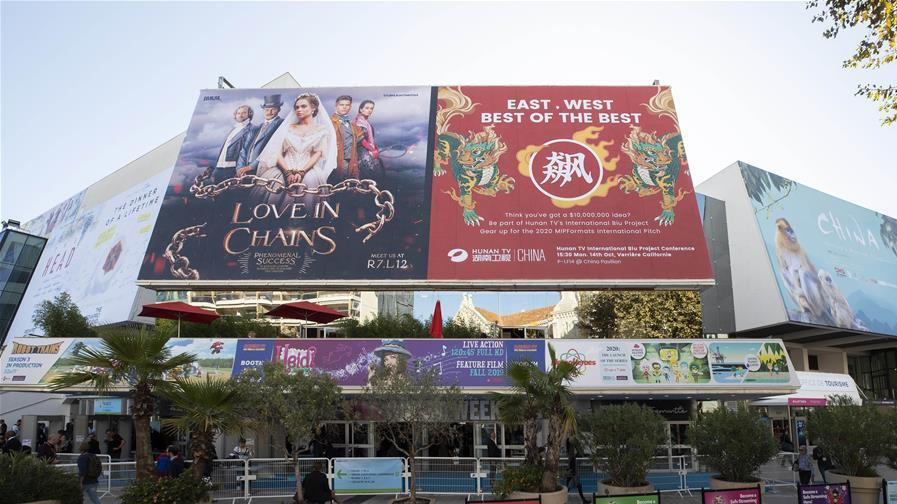
Giant posters are hung at Palais des Festivals, the venue of the 2019 International Market of Communications Programmes, Cannes, France, October 15, 2019. /Xinhua
Giant posters are hung at Palais des Festivals, the venue of the 2019 International Market of Communications Programmes, Cannes, France, October 15, 2019. /Xinhua
Editor's note: Yu Mengjie is a graduate from Clark University with a master's degree in communication. She works in the field of international film content distribution. The article reflects the author's opinions, and not necessarily the views of CGTN.
With COVID-19 raging across the world, recently another film event, the Orillia International Film Festival was called off. In the last few months, numerous highly expected concerts, festivals, film and TV shoots, and other events have been canceled or postponed, including Cannes Film Festival, Seattle International Film Festival, Hong Kong Filmart and Beijing International Film Festival. Taylor Swift, Green Day and Justin Bieber's concerts are all affected.
In this situation, a variety of measures were taken. Thanks to the internet, which almost became the only entertainment source during the quarantine, many movies and concerts turned to online release.
On April 17, singer Rene Liu held an online livestreaming concert, with the audience number surpassing 27 million according to a news release. The next day, singer Lady Gaga curated an online concert titled "One World: Together At Home." The Rolling Stones, Billie Eilish, Lang Lang and others joined in. The online concert raised almost 128 million U.S. dollars to support the frontline medical staff and the World Health Organization.
Meanwhile, industry events have also been making adjustments during the pandemic.
Tribeca Enterprises and YouTube joined forces to present the "We Are One" Online Film Festival, with the lineup including many traditional film markets such as Cannes, Venice and Toronto. The online showcase will start on May 29 with a 10-day streaming event. Beijing International Film Festival continues its online screenings with an extensive scale this year.
There is no doubt that the COVID-19 pandemic has changed our lives to some extent. Now, the question is, will these changes last forever? An opinion has been circulating in the entertainment industry that online entertainment is replacing the offline show business, especially the theater market. And many people believe the outbreak has catalyzed this process.
We have to admit that Video On Demand services (such as Netflix, Amazon Video) provide high flexibility to the audiences. As long as there is an internet connection, the time and occasion for watching movies are no longer limited.

Photo shows an empty street in Cannes, France, April 18, 2020. /Xinhua
Photo shows an empty street in Cannes, France, April 18, 2020. /Xinhua
With technological development, the invention of OTT (over the top) liberates the audience from the small screen and makes it easy to transfer content from their portable devices (smartphone or tablets) to the TV screens. It allows the audience to sit back on their living room sofa and watch programs comfortably.
Although our lifestyles, behaviors and habits are transforming with technological and environmental changes, it is too early to announce the demise of traditional methods. When the TV came, there was a concern that cinemas will be replaced. These thoughts continue to linger today, yet the cinemas stand tall.
There are several reasons that make offline entertainment irreplaceable. First, the offline entertainment provides the audiences with an immersive experience that is hard to create at home. When people go to a movie or concert, they are not only getting content from the big screen or the stage, they also interacting with people around them intentionally or unintentionally. Laughing, crying or even delightful exclamations make it a shared experience. Secondly, hanging out with friends or family over a local show is still a way to socialize that one can not easily let go of.
Back to the business field, many practitioners believe that the online screening or market can't replace the old patterns. Thierry Fremaux, director of Cannes Film Festival, once said, "If all the festivals are canceled, we will have to think of a way to showcase films, to avoid wasting a year, but I don't think a precarious and improvised alternative of Cannes or Venice – no sooner done than forgotten – would be the solution."
According to Fremaux, the traditional screening and market represent the soul, history and efficiency of the Cannes Film Festival. Indeed, film festivals with a big reputation never only mean movie evaluation and trade, they also provide an opportunity for film workers from all over the world to get together and share ideas, experiences and predictions.
Although the coronavirus has hit the pause button of the global offline entertainment industry, its impact would not last forever. We are looking forward to the day for reunions at cinemas, concerts and film festivals.
(If you want to contribute and have specific expertise, please contact us at opinions@cgtn.com)